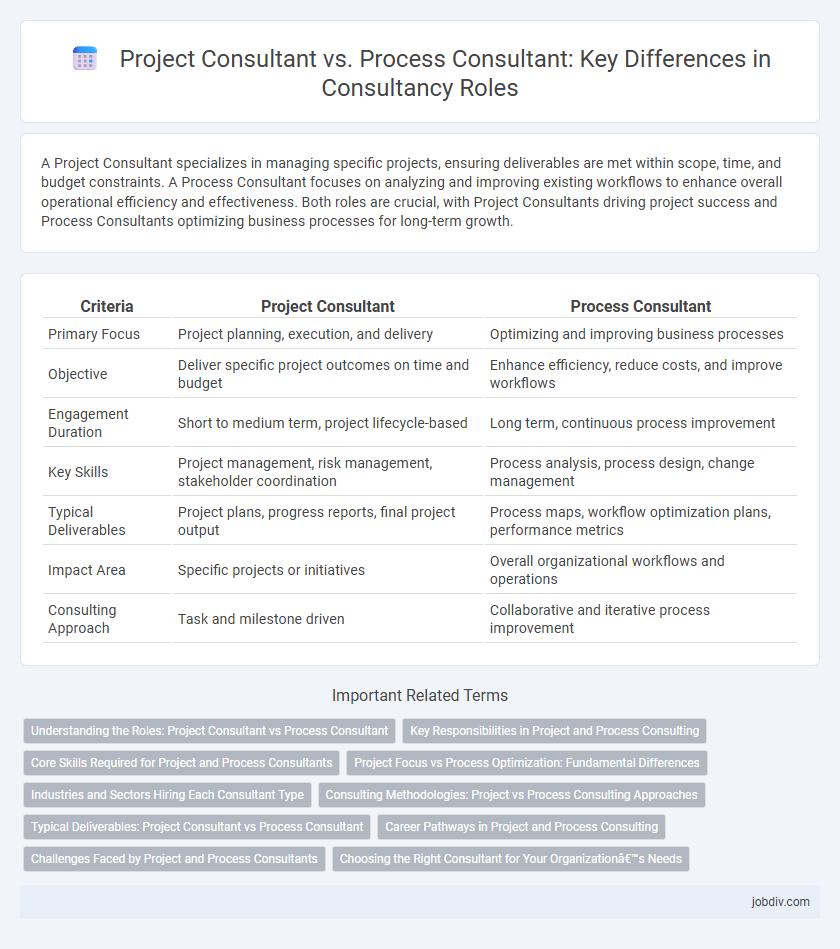A Project Consultant specializes in managing specific projects, ensuring deliverables are met within scope, time, and budget constraints. A Process Consultant focuses on analyzing and improving existing workflows to enhance overall operational efficiency and effectiveness. Both roles are crucial, with Project Consultants driving project success and Process Consultants optimizing business processes for long-term growth.
Table of Comparison
| Criteria | Project Consultant | Process Consultant |
|---|---|---|
| Primary Focus | Project planning, execution, and delivery | Optimizing and improving business processes |
| Objective | Deliver specific project outcomes on time and budget | Enhance efficiency, reduce costs, and improve workflows |
| Engagement Duration | Short to medium term, project lifecycle-based | Long term, continuous process improvement |
| Key Skills | Project management, risk management, stakeholder coordination | Process analysis, process design, change management |
| Typical Deliverables | Project plans, progress reports, final project output | Process maps, workflow optimization plans, performance metrics |
| Impact Area | Specific projects or initiatives | Overall organizational workflows and operations |
| Consulting Approach | Task and milestone driven | Collaborative and iterative process improvement |
Understanding the Roles: Project Consultant vs Process Consultant
Project consultants specialize in managing specific initiatives by delivering targeted solutions within defined timelines and budgets, focusing on project scope, milestones, and stakeholder coordination. Process consultants analyze and optimize organizational workflows, emphasizing continuous improvement, efficiency, and alignment with strategic goals through detailed process mapping and change management. Understanding the distinct roles helps organizations allocate resources effectively and maximize both project delivery and operational performance.
Key Responsibilities in Project and Process Consulting
Project Consultants focus on defining project scope, managing timelines, allocating resources, and ensuring deliverables meet client expectations. Process Consultants analyze existing workflows, identify inefficiencies, and design optimized procedures to enhance operational performance. Both roles require strong stakeholder communication but differ in project execution versus continuous process improvement.
Core Skills Required for Project and Process Consultants
Project consultants require strong skills in project management, including scope definition, risk assessment, and timeline coordination, to ensure successful delivery within budget and deadlines. Process consultants must excel in process analysis, workflow optimization, and change management to improve organizational efficiency and operational performance. Both roles demand effective communication, stakeholder engagement, and problem-solving to drive strategic outcomes.
Project Focus vs Process Optimization: Fundamental Differences
Project Consultants specialize in managing specific initiatives with defined goals, timelines, and deliverables, ensuring successful project completion. Process Consultants concentrate on analyzing and enhancing existing business processes to improve efficiency, reduce costs, and increase quality over time. The fundamental difference lies in Project Consultants driving project-focused outcomes while Process Consultants prioritize continuous process optimization for long-term organizational performance.
Industries and Sectors Hiring Each Consultant Type
Project consultants are primarily sought after in construction, IT, and engineering industries where specific project management, timelines, and deliverables are critical. Process consultants find higher demand in manufacturing, healthcare, and financial sectors, focusing on optimizing workflows, improving operational efficiency, and ensuring compliance with industry standards. Organizations aiming for innovation and digital transformation often engage both consultants to balance project execution with process improvement.
Consulting Methodologies: Project vs Process Consulting Approaches
Project consultants apply methodologies centered on defined phases, deliverables, and timelines to achieve specific objectives, using frameworks such as PMI or PRINCE2. Process consultants focus on continuous improvement and organizational change, employing techniques like Lean, Six Sigma, and workflow analysis to optimize efficiency. The choice between project and process consulting approaches depends on whether the client requires discrete project execution or ongoing process enhancement.
Typical Deliverables: Project Consultant vs Process Consultant
Project consultants typically deliver comprehensive project plans, risk assessments, and milestone reports tailored to specific project goals and timelines. Process consultants focus on diagnosing process inefficiencies, designing process improvement frameworks, and facilitating implementation of optimized workflows. Both roles prioritize detailed documentation and stakeholder communication but differ in deliverables centered on project execution versus process enhancement.
Career Pathways in Project and Process Consulting
Project consultants specialize in managing and delivering specific projects within defined timelines, often progressing towards roles such as Program Manager or Project Director. Process consultants focus on analyzing and improving business processes, typically advancing into positions like Business Process Manager or Operations Consultant. Career pathways in project consulting emphasize skills in project management and stakeholder communication, while process consulting careers prioritize expertise in process optimization and change management.
Challenges Faced by Project and Process Consultants
Project consultants frequently encounter challenges such as scope creep, resource allocation conflicts, and managing tight deadlines while ensuring deliverable quality. Process consultants often struggle with resistance to change, identifying inefficiencies across complex workflows, and aligning process improvements with organizational goals. Both roles demand strong communication skills and adaptability to overcome stakeholder misalignment and evolving project or process requirements.
Choosing the Right Consultant for Your Organization’s Needs
Project consultants specialize in managing specific projects from initiation to completion, ensuring timely delivery, budget adherence, and scope management, ideal for organizations needing focused expertise on defined objectives. Process consultants analyze and optimize internal workflows, enhancing efficiency, reducing costs, and improving overall organizational performance, making them suitable for businesses seeking long-term operational improvements. Choosing the right consultant depends on whether your organization requires targeted project execution or comprehensive process enhancement to achieve strategic goals effectively.
Project Consultant vs Process Consultant Infographic

 jobdiv.com
jobdiv.com